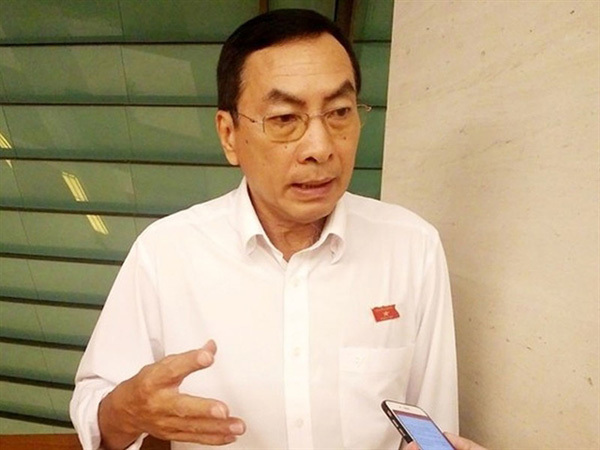 |
| Member of National Assembly’s Committee for Legal Affairs Pham Van Hoa. — Photo baodautu.vn |
While Vietnam’s National Assembly is discussing the draft amended Law on Vietnamese Guest Workers under Contract, South Korea – one of the major recipients of Vietnamese workers – has suspended receiving labourers who are from some localities of Vietnam. What do you think about the two moves?
In the last five years, Vietnam annually sent more than 130,000 workers overseas to work under contracts, which helped offer jobs, increase people’s life quality and improve national human resources.
However, the labour export activities had problems for both companies that provide labour export services and migrant workers. For example, the companies lured people, required them to pay high fees or sent the workers aboard and then left them there without care or support. Some migrant workers did not obey signed contracts with companies and ran away to work illegally for other companies, illegally stayed in the host countries or violated laws of the host countries. These are some reasons why some labour recipients refuse workers who come from localities with a high rate of these problems.
It’s a sorry situation that South Korea has announced it will stop receiving workers who come from ten such districts in Vietnam. This incident also helps prove the law on Vietnamese guest workers under contract needs to be revised to address problems and improve the quality of human resources. New contents were proposed in the draft of the amended law, of which, I would like to draw attention to the regulation allowing public non-business units run by provinces/cities People’s Committees to send workers abroad as part of international treaties and international agreements.
Can you clarify the participation of State organisations in sending Vietnamese workers abroad?
Recently, some localities of Vietnam and those in other countries like South Korea, Japan and China agreed to send and receive guest workers. Accordingly, local governments signed agreements with localities or associations in other countries on sending labourers. The local governments assigned public non-business units to be in charge of the agreements because these activities are non-profitable and companies don't want to be involved in non-profitable business.
Public non-business units are usually known as those which provide goods and public services for society and other goods/services in education, health care, information, sports, agriculture, forestry and aquaculture, helping maintain normal operations of national economic sectors. The units operate mostly to serve the public instead of seeking profit.
At present, companies/organisations can send workers abroad when they meet criteria including to have legal capital of VND5 billion (USD217,400), have operation plans to send workers abroad and have a bank deposit of VND1 billion ($43,500).
Will there be unfair competition between public non-business units and companies when they are both allowed to send workers abroad?
I don't think so. Public non-business units only assist some eligible groups including demobilised soldiers facing difficulties, those from poor or near-poor households or families which enjoy preferential treatment policies. Workers who are not included in those groups would have to apply to labour export companies if they want to work overseas.
The number of contracts between Vietnamese localities and those of labour receiving countries is still modest while there is huge demand for working overseas. So, I don’t think there will be any competition among public non-business unit and companies specialised in sending people abroad for working.
Do you think Vietnamese guest workers sent by public non-business units will commit similar violations to their peers from licensed labour companies?
Some localities like the southern provinces of Dong Thap and the central province of Ninh Thuan sent workers abroad via public non-business units and all the guest workers strictly followed contracts as well as regulations.
Employers in the host countries said they were very satisfied with the workers’ performance, behaviour and communication.
Workers sent abroad by public non-business are selected carefully, so they are seen to have better discipline.
When employers in host countries have demand for labour, they sign a contract with their syndication in their own countries. The syndication then signs a contract with a locality in Vietnam.
In Vietnam, the local People’s Committee will assign a public unit to recruit candidates with detailed criteria. The public unit will hire another unit to train the recruited candidates in terms of job skills, language, communication at work as well as equip them with proper understanding about the host country’s culture and lifestyle. Only shortlisted candidates will be sent abroad.
Shortlisted candidates will be supported to get preferential loans if they face financial difficulties.
With this way of recruitment, I think few workers will break the contract or violate laws of the host countries to solely seek personal benefits. VNS/Dau Tu

Law expected to better protect Vietnamese guest workers
Clear and detailed regulations are needed to strictly punish those who abuse labour export policies to make illegal profits, National Assembly deputies said on Wednesday morning

Labor exports: Hard-earned money and desolated villages
Labor export has been a common practice for poverty-stricken provinces of Vietnam for many years, both via legal and irregular gateways.
 Member of the National Assembly’s Committee for Legal Affairs Pham Van Hoa talks about the added regulation that allows public non-business units run by provincial and municipal People’s Committees to send workers abroad." itemprop="description" />
Member of the National Assembly’s Committee for Legal Affairs Pham Van Hoa talks about the added regulation that allows public non-business units run by provincial and municipal People’s Committees to send workers abroad." itemprop="description" />